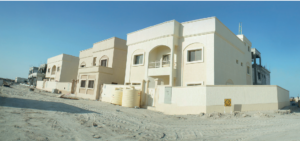The right to housing in Kuwait: An urban injustice in a socially just system:
This work examines the extent to which land-use policies and social housing laws have contributed to the demise of the urbanization process of a city. It is set in the context of Kuwait – a city-state that has undergone a short but rapid urbanization history that only started in the 1950s after the discovery of oil. The paper traces the methods of housing welfare distribution and questions their role in promoting justice in an environment of increasing housing application backlog, endless sprawl and continually rising housing property values. It challenges the current cultural explanations for the lack of fundamental redress of the present state legislation, and supports this view through a tracing of historical precedents and exploration within ongoing changes in urban ways of life in Kuwait. Instead, through a set of semi-structured interviews conducted with both state officials and local citizens, it identifies the effect of urban policy on society, which has induced an entitlement notion framed from a ‘rights’ perspective. In an environment of unsustainable wealth-distribution methods that not only treat the city as a flat landscape but also are open to abuse, this paper calls for an absolute need for a re-evaluation of the current practice that not only raises the quality of life for citizens today, but grants justice for generations to come.
INTRODUCTION:
‘With a proposition as such, you would start a parliamentary questioning!’ This was the response of a government official working for the Kuwaiti municipality at a UN Habitat workshop to discuss particular housing issues in Kuwait. The suggestion so frowned upon, made by me during a larger debate on housing ideology in the country, was a reconsideration of the type of welfare housing that is currently in place: the single-family detached home. The workshop’s focus on foreign labour accommodation reinforced the distinct difference between the 1.1 million Kuwaiti urban-elite minority and the 2.4 million non-nationals in their country (State of Kuwait 2011a). Mr. Mishaal’s tone rang with disapproval. For a Kuwaiti national who benefits, together with his fellow citizens, from the numerous offerings that this welfare city-state has continued to pour out on those who were born not necessarily in Kuwait but to a Kuwaiti father, this suggestion was alarming.
Literature that focuses on the welfare economy in Kuwait, together with social discourse and modernization of the state, aids in understanding the rapid development of the country and the initial intentions of its leaders. The development of the master plans and the housing laws were key primary sources for the evaluation. Trends in the property market in Kuwait, particularly in relation to private Kuwaiti housing, were juxtaposed with fieldwork explorations which entailed visiting and understanding different housing neighbourhoods that were planned and built at different times, and analysing the various physical manifestations and typologies that emerged with time.
CONCLUSION:
Kuwait today is in need of a moment of fundamental redress. The issue at stake is not solely one of unmanageable housing backlog, but rather a much larger social and economic one. A contrived sense of entitlement has resulted in unsustainable growth of the city that is difficult to reverse. The citizens’ dependence on the state to distribute its resources has become an established means of wealth creation. Its generous welfare policies have ingrained a sense of complete state reliance, yet its housing ownership facilitations have promoted opportunism. The result is further dependence on the state without acknowledgement of the limits of its resources.

ALSO READ: Solutions to the Affordable Housing crisis: Perspective on Privatization
